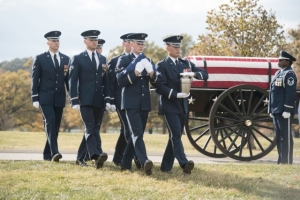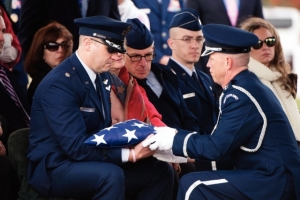Laid to rest
By Joey Pitchford
Published in News on December 6, 2016 9:08 AM

Submitted photo
Members of the U.S. Air Force participate in the graveside service for U.S. Air Force Maj. Candice Ismirle, Nov. 9, in Arlington, Virginia. She was buried in Section 76 of Arlington National Cemetery. (Photos courtesy of Rachel Larue/Arlington National Cemetery)

Submitted photo
Lt. Col. Ryan Ismirle, left, receives the American Flag during the graveside service for his wife, Maj. Candice Ismirle, Nov. 9, in Arlington, Virginia.

Submitted photo
Maj. Candice Ismirle and Lt. Col. Ryan Ismirle hold their newborn twins, Ryder and Rafe in 2014.
When diagnosed with a life-threatening illness like cancer, a person must make a choice.
They can give up, accept that their life is over and let the illness define them.
Or they can fight, unceasingly and without apology, to see their life lived to the fullest in spite of it.
For Maj. Candice Ismirle, who was buried at Arlington National Cemetery Nov. 9, the decision to fight was never in question.
A "military brat," as her husband Lt. Col. Ryan Ismirle called her, Mrs. Ismirle was born on Travis Air Force Base in California on April 22, 1981. Her early life was surrounded by the military- her father retired from the Air Force as a Senior Master Sgt. when she was around 13 years old- and her affinity for the armed forces shaped her decisions as she grew older.
"She was firmly an Air Force kid, and really saw value in service, not just because of what her dad did but because of how her family raised her," Ismirle said. "She was smart and she was athletic and she wanted to go to college. And Air Force ROTC made a lot of sense so that's what she did."
That path in 2003 lead to the Air Force itself, where Mrs. Ismirle became a public affairs officer. It was while at Squadron Officer's School, a mid-level training school for Air Force captains at Maxwell Air Force Base in Alabama, that Ismirle met her.
"I say it was fortuitous, because I was stationed here at Seymour Johnson, and I had just finished my training in the F-15E. I was on my way to England for my first operational assignment as a pilot in the F-15E. En route to that I went to Maxwell, and it was one of the last opportunities in terms of timing for that school that I could have gone," Ismirle said. "Candice was stationed in Alaska at the time, and she was a public affairs officer for that base. She was sent on her earliest opportunity to go, so it was kind of fortuitous. Neither of us probably should have been in that class, but we both were."
As luck would have it, they ended up sitting next to each other their first day in class, and struck up a friendship over the course of their classes. They kept in contact after leaving the school, even as Ismirle continued on to his post in England and Mrs. Ismirle returned to Alaska. Over the next six or seven months, they continued to talk to one another and eventually built a romantic relationship, regardless of the 13 hours -- and hundreds of miles -- between them.
Within around a year-and-a-half of dating, near the end of Ismirle's assignment, the two were engaged.
It was also around then that Mrs. Ismirle was first diagnosed with breast cancer.
"I had actually just come back from a deployment in Afghanistan, and she had come over and we were on a trip around Europe during my leave," Ismirle said. "And that's when she found the lump, was on our trip."
When Mrs. Ismirle returned to the states, doctors confirmed her diagnosis.
Initially, the pair were not overly concerned. Mrs. Ismirle was just 29, of good health and had caught the cancer at an early stage. While talks and worries of the "what-ifs" inevitably surrounded the diagnosis, Ismirle said the couple's conversations at the time were not particularly grim or worried.
"We were feeling positive, and I was doing my level best to ensure that she remained positive," he said. "So the conversations we had were her treatment, and then me getting there to be with her during it."
Ismirle had already received his assignment at Seymour Johnson by this point, but he flew back ahead of time for a few days while Mrs. Ismirle made a variety of doctor visits. While he was back, the pair had a justice of the peace wedding in order to be legally married, which would allow Ismirle to move to be with his new wife. The Air Force does not move airmen to be with their fiancees, but does do so for married couples.
The two also took fertility conservation measures, freezing some of Mrs. Ismirle's eggs to preserve them for the future. Cancer treatment, which often includes high doses of radiation, can completely destroy a woman's ability to have children, and Mrs. Ismirle wanted to make sure she could still be a mother.
Ismirle soon secured an assignment change to Washington D.C., where he and Mrs. Ismirle moved in together. Mrs. Ismirle's treatment went well, and after a double mastectomy her cancer was declared in remission by April of 2013.
Ismirle said that he and Mrs. Ismirle had done well to move on with their lives in spite of her illness.
"We had felt as though we had beat it, and that we would always just have to pay attention, be more in tune," he said. "But we thought it was behind us, to the point even where we were attempting to start a family."
Then, while getting ready for work one day in September of 2013, Ismirle walked downstairs to find his wife in the middle of a seizure. She was still conscious at the time, and Ismirle rushed her to the hospital.
Doctors found lesions in Mrs. Ismirle's brain, and cancer spread throughout her abdomen. She had relapsed.
At that moment, Ismirle said, everything changed. The neurosurgeon who consulted the couple initially gave Mrs. Ismirle an estimated six months to a year to live.
Even then, the couple kept their eyes trained on the future.
"We didn't have more than an off-hand discussion about 'oh I want to be cremated' or anything like that," Ismirle said. "It kind of started going that way, but we stopped talking and said 'no, we need to stay positive.'"
Just as before, Mrs. Ismirle opted for aggressive treatment, not content to simply manage her pain and let the illness take its toll. The treatment, which included brain surgery and full brain radiation, virtually eliminated the cancer in her brain, which Ismirle said was "a big win."
The couple soon received another blessing. Mrs. Ismirles cousin, Erin McKenney, came forward to offer herself as a gestational surrogate for Mrs. Ismirles preserved eggs. The Ismirles gratefully accepted, and nine months later held their twin sons, Ryder and Rafe. As unlikely as it had seemed, Mrs. Ismirle was a mother after all.
For all the battles won, however, the war was turning. Mrs. Ismirle's cancer had progressed past the ability of modern medicine to cure, and Ismirle said things had become more about making the best of the remaining time instead of focusing on finding a cure.
Still, Mrs. Ismirle looked to the future, regardless of how foggy it may have been. The family moved back to North Carolina in August of 2015, a choice that Ismirle said was primarily his wife's.
"To be quite honest, that was her decision. She felt like cancer had controlled her life long enough and she wanted to attempt to move on with life," he said.
Cancer, though, has a cruel habit of not allowing people to move on. By December of 2015, Mrs. Ismirle's disease had once again spread to her brain.
Just a month later, her cognitive ability had dropped off substantially. Soon, Mrs. Ismirle was no longer able to hold a conversation. At the time, Ismirle and some doctors thought that a change in her medicines might be to blame.
"It happened extraordinarily fast," Ismirle said. "She was still functioning, but she wouldn't eat, or really drink. I had to put her in the hospital for it, and from that point she never really came back from that."
It was around a week after Mrs. Ismirle entered the hospital that doctors confirmed cancer was the cause of her decline. Six days later, on February 12, 2016, she died.
Suddenly, Ismirle was by himself, with two 15-month-old boys to take care of in a house full of his wife's belongings. The military has helped with paid leave and various resources, but also in less tangible ways.
"There's those things that are part of how the Air Force handles these things, which I think is good and helpful," he said. "And then there's the military family, which is all the people, the relationships you have, the people you know."
Mrs. Ismirle was cremated, and then buried at Arlington in early November. While being buried at Arlington can be done fairly quickly, Ismirle said he was going to make sure Mrs. Ismirle received full military honors at her funeral, even if that meant six months of waiting in line.
Ismirle's home is still full of his wife's things. Small reminders linger in everyday life, making it impossible to simply "move on" ---- if such a thing were ever possible to begin with.
Still, with each passing day, each foot placed in front of the other, things get a little bit easier.
"It's an iterative process. As you get further away, time heals," he said. "It's not a close the chapter, open a new one kind of thing, especially with the two young boys. It's not that clean."
Coming up on the first Christmas without his wife, Ismirle is looking to the future, just as she always did. Although his boys will not have memory of their mother, he said he will work to make sure they know who she was. He recalled one of her common phrases which he felt summed up her view on life.
"Choose to celebrate life, rather than simply survive it."
It is fitting, then, that even after Mrs. Ismirle's death, the celebration of her life carries on.
